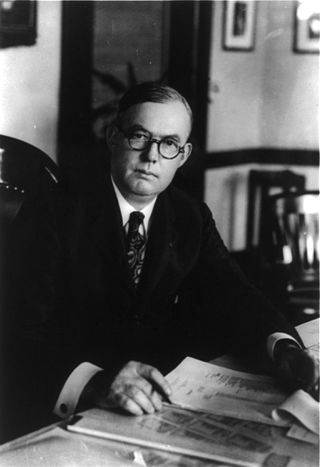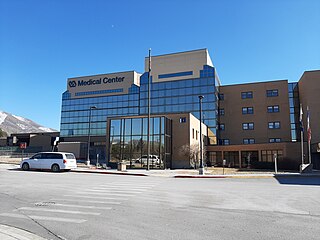
Rutherford County is a county located in the U.S. state of Tennessee. It is located in Middle Tennessee. As of a 2023 estimate, the population was 367,101, making it the fifth-most populous county in Tennessee. A study conducted by the University of Tennessee projects Rutherford County to become the third largest county in Tennessee by population by 2050. Its county seat is Murfreesboro, which is also the geographic center of Tennessee. As of 2010, it is the center of population of Tennessee. Rutherford County is included in the Nashville-Davidson–Murfreesboro–Franklin, TN Metropolitan Statistical Area.
Walgreens is an American company that operates the second-largest pharmacy store chain in the United States, behind CVS Health. It specializes in filling prescriptions, health and wellness products, health information, and photo services. It was founded in Chicago in 1901, and is headquartered in the Chicago suburb of Deerfield, Illinois. On December 31, 2014, Walgreens and Switzerland-based Alliance Boots merged to form a new holding company, Walgreens Boots Alliance. Walgreens became a subsidiary of the new company, which retained its Deerfield headquarters and trades on the Nasdaq under the symbol WBA.
Canada Drugs otherwise known as CanadaDrugs.com, was an online pharmacy based in Winnipeg, Manitoba.

The University of Vermont Medical Center (UVMMC) is a five-campus academic medical facility under the corporate umbrella of the University of Vermont Health Network that is anchored by a 562-bed hospital in Burlington, Vermont. UVMMC is based in Burlington and serves as both a regional referral center and a community hospital. The hospital was formerly known as the Medical Center Hospital of Vermont and later as Fletcher Allen Health Care until getting its current name. It is affiliated with the University of Vermont's Robert Larner College of Medicine and its College of Nursing and Health Sciences.
The presidency of Ronald Reagan was marked by numerous scandals, resulting in the investigation, indictment or conviction of over 138 administration officials, the largest number for any president of the United States.
Christopher William Smith ("Rizler") was a prolific e-mail spammer, and sold drugs online from his illegal Xpress Pharmacy Direct in Burnsville, Minnesota, United States. He was released from prison on October 13, 2020.
In the United States, a pharmacy benefit manager (PBM) is a third-party administrator of prescription drug programs for commercial health plans, self-insured employer plans, Medicare Part D plans, the Federal Employees Health Benefits Program, and state government employee plans. PBMs operate inside of integrated healthcare systems, as part of retail pharmacies, and as part of insurance companies.

Charles Robert Forbes was a Scottish-American politician and military officer. Appointed the first director of the Veterans' Bureau by President Warren G. Harding on August 9, 1921, Forbes served until February 28, 1923. His tenure was characterized by corruption and scandal.

The Veterans Health Information Systems and Technology Architecture (VISTA) is the system of record for the clinical, administrative and financial operations of the Veterans Health Administration VISTA consists of over 180 clinical, financial, and administrative applications integrated within a single shared lifelong database (figure 1).
Health care fraud includes "snake oil" marketing, health insurance fraud, drug fraud, and medical fraud. Health insurance fraud occurs when a company or an individual defrauds an insurer or government health care program, such as Medicare or equivalent State programs. The manner in which this is done varies, and persons engaging in fraud are always seeking new ways to circumvent the law. Damages from fraud can be recovered by use of the False Claims Act, most commonly under the qui tam provisions which rewards an individual for being a "whistleblower", or relator (law).
Pharmaceutical fraud is when pharmaceutical companies engage in illegal, fraudulent activities to the detriment of patients and/or insurers. Examples include counterfeit drugs that do not contain the active ingredient, false claims in packaging and marketing, suppression of negative information regarding the efficacy or safety of the drug, and violating pricing regulations.

A New England Compounding Center meningitis outbreak that began in September 2012 sickened 798 individuals and resulted in the deaths of more than 100 people. In September 2012, the Centers for Disease Control and Prevention, in collaboration with state and local health departments and the Food and Drug Administration (FDA), began investigating a multistate outbreak of fungal meningitis and other infections among patients who had received contaminated steroid injections from the New England Compounding Center (NECC) in Framingham, Massachusetts. The NECC was classified as a compounding pharmacy. The traditional role of compounding pharmacies is to make drugs prescribed by doctors for specific patients with needs that can't be met by commercially available drugs.
Insys Therapeutics was an American specialty pharmaceutical company based in Chandler, Arizona in 1990. Its main product was Subsys, a sublingual liquid form of the drug fentanyl. Fentanyl is an extremely fast-acting and powerful opioid used to relieve breakthrough pain in cancer patients, and prescription of fentanyl in the US for such pain usually requires documented failure of more conservative therapies.

Erin Nealy Cox is an American attorney who served as the United States Attorney for the United States District Court for the Northern District of Texas from 2017 to 2021. She was nominated to the position by President Donald Trump and confirmed by the U.S. Senate in 2017. After the 2020 election, she resigned effective January 9, 2021, and joined Kirkland & Ellis as a partner on June 23, 2021.
Charles H. Reardon is a former American penal official who served as sheriff of Essex County, Massachusetts from 1978 to 1996.
ScripTalk is an audible medication label technology designed to give access to individuals who are blind, visually impaired, or print impaired. It consists of a device and a microchip attached to the bottom of a prescription drug bottle. The label information is encoded on a Radio-frequency identification (RFID) electronic label (microchip) using the ScriptAbility software by a pharmacist and placed on the prescription package. ScripTalk prescription labels were introduced in the early 2000s. As of 2020, the technology was applied through the United States and Canada.

The George E. Wahlen Veterans Affairs Medical Center (VAMC) is located in Salt Lake City, Utah, and is a part of the VA Salt Lake City Healthcare System. The George E. Wahlen VA Hospital is a 121-bed short-term acute care hospital and is designated as a medical training and research facility. For the scale of operations in 2021, the George E. Wahlen VA had 2,739 employees, treated 72,303 veterans, and accommodated nearly 703,109 outpatient visits. As of 2021, of the veterans treated here, 31,786 served in the Persian Gulf, 27,029 served in the Vietnam War, 803 in World War II, 2,911 served in the Korean War, and 5,519 were women. During 2021, the George E. Wahlen VA federal budget allocation was over $743 million. The George E. Wahlen Medical Center is one of only five Veterans Affairs heart transplant centers in the United States. The facility is encompassed within the Veterans Integrated Service Network 19 within the Rocky Mountain Region.






